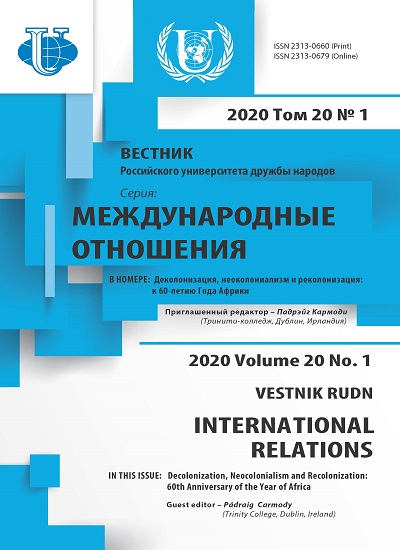The UN Development Decades (1961-2000): Evolution of Appraisal Systems in the Context of Development Theories
- 作者: Larionova M.V.1
-
隶属关系:
- Russian Presidential Academy of National Economy and Public Administration under the President of the Russian Federation
- 期: 卷 20, 编号 1 (2020): Decolonization, Neocolonialism and Recolonization: 60th Anniversary of the Year of Africa
- 页面: 170-183
- 栏目: 国际经济关系
- URL: https://journals.rudn.ru/international-relations/article/view/23330
- DOI: https://doi.org/10.22363/2313-0660-2020-20-1-170-183
- ID: 23330
如何引用文章
全文:
详细
The article explores the review and appraisal systems’ dynamics in the period from the First to the Fourth UN Development Decades in the context of the dominant developmental theories’ evolution. To reveal possible interrelations the author uses the methods of comparative assessment and periodization. The overview draws on analysis on resolutions and documents of the UN General Assembly adopted in 1960-2000, expert materials, academic research and international institutions’ reports. Development concepts which emerged in 1960-2000 had an undoubted influence on cooperation for development and the review and appraisal parameters. Developmental stages theory and modernization theory defined the priorities and parameters of the First Development Decade’s (1961-1970). In 1970s, growing economic interdependence, detente and the outcomes of the First Decade’s which showed that development could not be driven exclusively by modernization, industrialization and economic growth, determined emergence of the dependence theory and the alternative development concept. The new thinking was reflected in the provisions of the Second Development Decade. The Third Development Decade (1981-1990) provisions were built on a compromise between the dependence theory, modernization theory and the alternative development concept. For the first time concrete parameters of social development, eradication of poverty and inequality were specified. The Fourth Development Decade provisions revealed the influence of the neoliberalism in its “post-Washington consensus” reincarnation and the sustainable development concept. In the nineties the human development discourse put equality, wellbeing and freedom at the core of the development, bringing a new focus on the social and human development indicators.
作者简介
Marina Larionova
Russian Presidential Academy of National Economy and Public Administration under the President of the Russian Federation
编辑信件的主要联系方式.
Email: larionova-mv@ranepa.ru
PhD, Dr. of Sc. (Political Science), Director, Center for International Institutions Research
Moscow, Russian Federation参考
- Alonso, J.A. & Glennie, J. (2015). What is Development Cooperation? 2016 Development Cooperation Policy Briefs. February, No. 1. P. 1—5. URL: https://www.un.org/en/ecosoc/newfunct/pdf15/2016_dcf_policy_brief_no.1.pdf (accessed: 18.12.2019).
- Amin, S. (1990). Maldevelopment Anatomy of a Global Failure. Tokyo: United Nations University Press.
- Bartenev, V.I. & Glazunova, E.N. (Eds.). (2012). International Development Assistance: Lecture Course. Moscow: World Bank publ. (In Russian).
- Deepak, L. (1997). The Poverty of ‘Development Economics’. London: The Institute of Economic Affairs.
- Evaluating the Impact of International Development Cooperation: A Methodological Proposal. (2019). Social Value Italia. URL: https://www.cosv.org/wp-content/uploads/2019/04/EVALUATING-THE-IMPACT-OF-INTERNATIONAL-DEVELOPMENT-COOPERATION.pdf (accessed: 18.12.2019).
- Fischer, S. (2012). The Washington Consensus. In: Fred Bergsten, C. & Randall Henning, C. (Eds.). Global Economics in Extraordinary Times: Essays in Honor of John Williamson. PIIE.
- Hammarskjöld, D. (1975). What Now. The 1975 Dag Hammarskjöld Report on Development and International Cooperation. Dag Hammarskjöld Foundation. URL: http://www.daghammarskjold.se/wp-content/uploads/2016/07/What-Now-1975.pdf (accessed: 18.12.2019).
- Hettne, B. (1995). Development Theory and the Three Worlds: Towards an International Political Economy of Development. New York: Longman.
- Hettne, B. (2002). Current Trends and Future Options in Development Studies. In: Desai, V. & Potter, R.B. (Eds.). The Companion to Development Studies. London: Harold Arnold. P. 7—12.
- Hirschman, A.O. (1958). The Strategy of Economic Development. New Haven: Yale University Press.
- Knutsson, B. (2019). The Intellectual History of Development: Towards a Widening Potential Repertoire. Perspectives, 13, 1–47. School of Global Studies, Göteborgs Universitet.
- Larionova, M.V. & Safonkina, E.A. (2018). The First Five Decades of Cooperation for Development. Actors, Achievements and Challenges. International Organizations Research Journal, 13 (4), 96—121. (In Russian and in English). doi: 10.17323/1996-7845-2018-04-05
- Larionova, M.V. (2020). Challenges for the UN Millennium Goals. International Organizations Research Journal, 15 (2). (In print). (In Russian).
- Nerfin, M. (Eds.). (1977). Another Development: Approaches and Strategies. Uppsala: Dag Hammarskjöld Foundation.
- OECD. (2016). Evaluation Systems in Development Co-operation: 2016 Review. Paris: OECD Publishing. doi: 10.1787/9789264262065-en
- Rist, G. (1997). The History of Development: from Western Origins to Global Faith. London: Zed.
- Rostow, W.W. (1991). The Stages of Economic Growth: A Non-Communist Manifesto. Cambridge: Cambridge University Press.
- Seers, D. (1968). From Colonial Economics to Development Studies. The Institute of Development Studies. URL: https://opendocs.ids.ac.uk/opendocs/bitstream/handle/20.500.12413/11167/IDSB_1_1_10.1111-j.1759-5436.1968.mp1001002.x.pdf;jsessionid=9615F8F7B7BB4753413233A5F3894060?sequence=1 (accessed: 18.12.2019).
- Sen, A. (1999). Development as Freedom. Oxford: Oxford University Press.
- Simon, D. & Narman, A. (Eds.). (1999). Development as Theory and Practice. Current Perspectives on Development and Development Co-operation. London: Routledge.
- Streeten, P. (1982). First Things First: Meeting Basic Human Needs in the Developing Countries. Washington: World Bank.
- Williams, D. (2013). The History of International Development Aid. In: Moschella, M. & Weaver, C. (Eds.). Handbook of Global Economic Governance. London: Routledge.
- Williamson, J. (2004a). A Short History of the Washington Consensus. Institute for International Economics. URL: https://www.piie.com/publications/papers/williamson0904-2.pdf (accessed: 18.12.2019).
- Williamson, J. (2004b). The Washington Consensus as Policy Prescription for Development. Institute for International Economics. URL: https://www.piie.com/publications/papers/williamson0204.pdf (accessed: 18.12.2019).
补充文件








